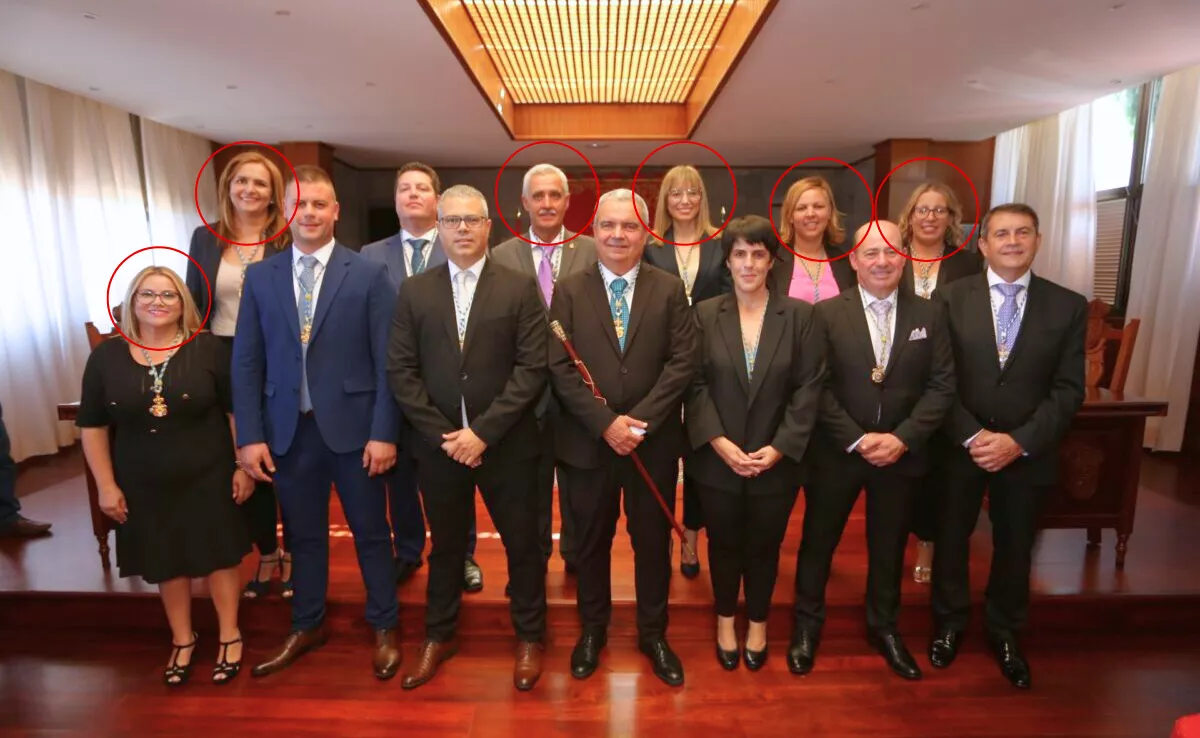
Six councillors from the San Miguel de Abona Town Council in Tenerife, led by Arturo E. González Henrández (Coalición Canaria) as mayor, will now receive a monthly salary increase of 300 euros gross, as agreed in the municipal plenary session in June, and officially published in the Official Bulletin of the Province of Santa Cruz de Tenerife (BOP) this week.
These include the councillor for Municipal Dependencies, Health, Consumer Affairs, Transport, Mobility, and Accessibility, Rosa Albina Ramos; the councillor for Tourism, Citizen Participation, Protocol, Collaboration, and Cooperation, Laura Remedios Paiz Acosta; the councillor for Maintenance of Public Services and Road Cleaning, Juan Valentín Padilla; the councillor for Culture, Education, Heritage Management, and Civil Protection and Emergencies, María Pilar Méndez; the councillor for Equality, Youth, Festivities, Recreational Activities, and the Elderly, Yurena María Melián; and the councillor for Agriculture, Nursery Schools, Children’s Parks, and Recreational Areas, Zenaida Cabrera Dorta.
For the first four councillors, who work full-time, the gross monthly salary will rise from 2,285 euros in 14 payments to 2,585 euros. The councillor for Equality, Youth, Festivities, Recreational Activities, and the Elderly will see her salary rise from 2,180 to 2,480 euros monthly in 14 payments due to her part-time dedication of 26 hours and 15 minutes per week, while the councillor for Agriculture, Nursery Schools, Children’s Parks, and Recreational Areas will increase from 1,715 to 2,015 euros on the same terms.
The justification provided by the council in the official announcement in the BOP is that the increase is due to “the greater workload and functional responsibility these positions entail, which requires direct coordination with technical staff, contract follow-ups, services and programmes, and communication with associations, entities, and citizens.” However, this has sparked controversy among the opposition led by the PSOE, the party that came second in the local elections and holds four councillor seats.
The government group is made up of 13 councillors, of which six are deputy mayors (one of whom, the sixth, works part-time), four are councillors with exclusive delegations, and two are delegated councillors with a 75% part-time dedication.
At the beginning of the legislature, a salary increase was already implemented. Based on this distribution, the Government Group set remuneration whereby the mayor’s salary increased by 15% compared to the previous legislature, reaching 56,360 euros gross per year, and the deputy mayors’ salaries rose by around 12% to a figure between 42,000 and 43,000 euros, depending on the position. This was reported in 2023 by Diario de Avisos, owing to the municipality surpassing 20,001 inhabitants, allowing for a new salary range according to the law.
At the beginning of the legislature, when the distribution of competencies for each councillorship was presented and salaries fixed, the PSOE criticised González Hernández’s government for the substantial salary disparity between the deputy mayors (approximately 43,000 euros annually, depending on the role) and the councillors with delegated services (30,520 euros for the highest-paid), claiming this constituted gender discrimination. It is noteworthy that five of the six deputy mayors in San Miguel de Abona are men (except Nuria Marrero Donate, the third deputy mayor) and five of the six delegated councillors are women (with the exception of Juan Valentín Padilla, who oversees Public Services).
According to the PSOE, this differentiation was perceived as a glass ceiling within the corporation.
Now, the Socialists are arguing that the Town Council has increased salaries, citing a “greater workload,” but according to the PSOE, this has not resulted in any changes to the delegated competencies of each councillor. Hence, the party believes that the powers and functions are the same as at the beginning of the legislature when they noted that the councillors earned much less than their deputy mayor counterparts.
Atlántico Hoy has submitted an information request to the mayor’s office of the municipality in southern Tenerife, asking whether the alleged increase in workload has resulted from any modification to the delegated functions approved by decree at the beginning of the legislature, whether there has been a similar increase in workload in other areas for the deputy mayors, for whom a higher salary was agreed at the outset, and if the council wishes to comment on the PSOE’s accusations. However, no response has been received to date.














